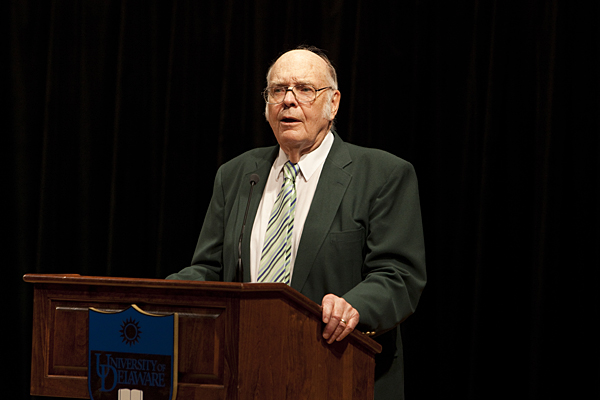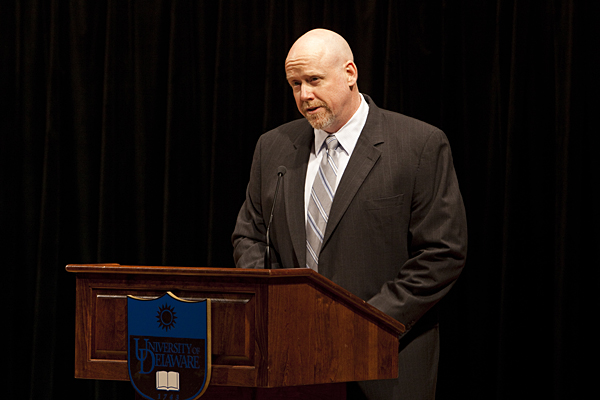Pulitzer winner recalled
UD symposium remembers life, poetry of W.D. Snodgrass
10:23 a.m., April 29, 2011--At the W.D. Snodgrass Symposium, held Wednesday, April 27, in the Roselle Center for the Arts, Snodgrass, who was Distinguished Professor of creative writing and contemporary literature at the University of Delaware from 1980-1994, was remembered vividly by those who knew him as teacher, colleague and poet.
Sharing their remembrances of the poet who died on Jan. 13, 2009, in upstate New York, were New Yorker essayist and author Adam Gopnik, poet X.J. Kennedy, and Gibbons Ruark, poet and UD Professor Emeritus of English.
Campus Stories
From graduates, faculty
Doctoral hooding
James Keegan, UD associate professor in the Associate in Arts Program in Georgetown, and a student of Snodgrass, read from the poet’s 1981 work “These Trees Stand.”
The audience especially applauded the ending lines: “If all this world runs battlefield or worse/Come, let us wipe our glasses on our shirts/Snodgrass is walking through the universe.”
“I’m glad that you read that wonderful poem, with the refrain, ‘Snodgrass is walking through the universe,” Kennedy said. “They remind us that he was not only amused by his own name, but he never renounced it.”
Kennedy, whose first collection of poetry, Nude Descending a Staircase (1961), won the Lamont Award of the Academy of American Poets, said he was struck after reading Heart’s Needle, for which Snodgrass received the 1960 Pulitzer Prize in poetry.
“Unlike so many poets of the time, Snodgrass was not afraid to express emotion,” Kennedy said. “Ezra Pound, who was wrong about so many things, was usually right about poetry. He remarked once, ‘In poetry, only emotion endures.’ I think Snodgrass’ poetry has endured and will endure for that reason and others.”
Snodgrass was not afraid to take on some of the most controversial subjects, including The Fuhrer Bunker: A Cycle of Poems in Progress (1977), Kennedy said.
“De [Snodgrass] always did things that other poets would not try,” Kennedy said. “He felt that the Nazis were human and did terrible things, and that we are human too, and if you look deep into yourself, you might find many of the same things.”
Gopnik said that Snodgrass was a member of the great generation of American poets who emerged at the end of the Second World War.
“This includes [Robert] Lowell, [Randall] Jarrell, [Elizabeth] Bishop, [Richard] Wilbur,” Gopnik said. “This looks to me as the richest generation of poets that has ever been produced in this country or in any other country. They are poets who continue to matter not just in the narrow world of academia, but in the larger world of readers who read for love and read for pleasure, who we still read and care passionately about.”
Kathleen Ann Snodgrass, who married the poet in 1985, recalled how some years ago she and her husband were watching a documentary on Miles Davis, when the jazz great said, “It takes a long time to sound like yourself.”
“Miles had hit the nail on the head,” Kathleen Snodgrass said. “De strove his whole life long to do just that, in his life and on the page.”
With a light, humorous touch, Ruark recalled lines from the Snodgrass poem, “The Lovers Go Fly a Kite,” where he described their “Hawk” as being a "poor moth of twigs and tissue/That would spill if one chill wind coughed/Dive down to tear, or to kiss you.”
“In my opinion, De Snodgrass should have been given his second Pulitzer Prize for rhyming the one word tissue with the two words kiss you,” Ruark said. “Normally, the directive, go fly a kite, is heard quite clearly as impatient and dismissive, but after reading that poem, I can’t help feeling that there the phrase is endorsing something fervid, daring and affirmative.”
Snodgrass also demonstrated that great poetry has the power to breathe new life into tired old clichés, Ruark said.
“De was ever a risk taker, and almost every time the risks were worth taking,” Ruark said. “They enriched the poetry in our lives.”
The event was partially funded by a grant from the Delaware Humanities Forum, a state program of the National Endowment for the Humanities. Sponsors also included the College of Arts and Sciences, the Department of Art History, Department of Foreign Languages and Literatures and the Morris Library.
A reception followed the event.
Article by Jerry Rhodes
Photos by Ambre Alexander













